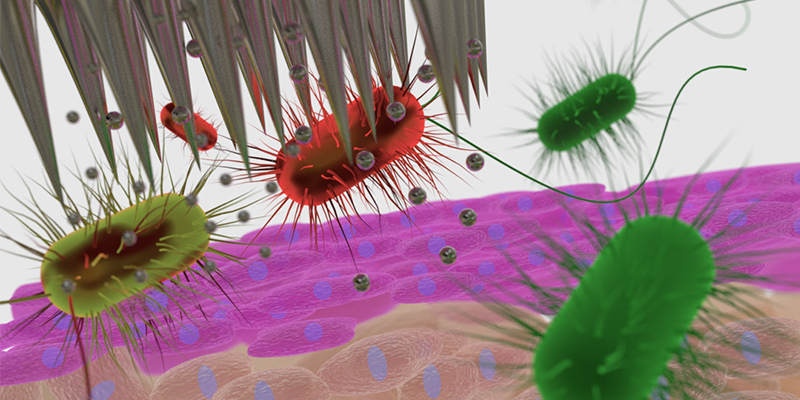Painless needles on the way for vaccinations
By Annabel Mansfield
 HEALTH A representation of a microneedle chip incorporating silver nanoparticles killing bacteria (in red)
HEALTH A representation of a microneedle chip incorporating silver nanoparticles killing bacteria (in red)Vaccinations are the world’s frontline defence against infectious diseases yet despite decades of interventions, unsafe injection practices continue to expose billions of people to serious infection and disease.
Now, new technology from UniSA is revolutionising safe vaccination practices through antibacterial, silver-loaded dissolvable microneedle patches, which not only sterilise the injection site to inhibit the growth of bacteria, but also physically dissolve after administration.
Lead researcher Professor Krasimir Vasilev says these first generation microneedle patches have the potential to transform the safe administration of transdermal vaccinations and drug delivery.
“Injections are one of the most common health care procedures used for vaccinations and curative care around the world,” Prof Vasilev says.
“But up to 40 per cent of injections are given with improperly sterilised syringes and needles, placing millions of people at risk of contracting a range of illnesses or diseases.
“Our silver-loaded microneedles have inherently potent antibacterial properties which inhibit the growth of pathogenic bacteria and reduce the chance of infection.”
The UniSA study tested the antibacterial efficacy of silver-loaded microneedle patches against bacteria associated with common skin infections – Golden staph, staphylococcus epidermis, escherichia coli and pseudomonas aeruginosa – and found that the silver-loaded microneedle patches created a 24-hour bacteria-free zone around the patch administration site, a feature unique to the new technology.
Microneedle patches are painless and dissolve after use
The silver-loaded microneedle patches comprise an array of 15 x 15 needles each 700 micron in length, which pierce only the top layer of the skin without reaching the underlying nerves, making them 100 per cent painless.
The microneedles are made from a safe, biocompatible and highly water-soluble polymer that completely dissolve within one minute of application, leaving behind no sharp waste.
The World Health Organization says that using the same syringe or needle to give injections to more than one person is driving the spread of deadly infectious diseases worldwide, estimating that each year this may cause up to 1.7 million people to be infected with hepatitis B, 315,000 with hepatitis C, and as many as 33,800 with HIV.
Prof Vasilev says the dissolvable feature of the microneedles will significantly improve injection safety.
“Infection from unsafe injection practices occurs all over the world,” Prof Vasilev says, “so technologies that protect people from unnecessary infection are critical.
“The dissolvable feature of our silver-loaded microneedles ensures absolutely no risk of reuse, removing one of the greatest causes of infection.
“And by incorporating the antibacterial silver nanoparticles into the dissolvable microneedles, we’ve created a very promising vehicle for safe vaccine and drug delivery around the world.”
Other Stories
- Painless needles on the way for vaccinations
- Hi. How can I help you? Health clinic embraces the robot age
- Virtual health coach ‘Paola’ will help you get fit and eat well
- Carbon-free renewable energy solution to ‘heat up’ industry
- From the Vice Chancellor
- Achievements and Announcements
- The technology to take a jury into a 3D crime scene
- Oscars 2019 plays it safe with Green Book, lacks enlightened thinking
- Organ-on-a-chip technology to reduce side effects of radiotherapy
- Find out about UniSA’s dedicated student support services (Video)
- International defence research lab with France planned for Adelaide
- New innovation hub in Whyalla to nurture regional startups
- The latest books from UniSA researchers
- In Pictures




